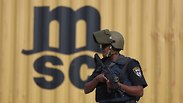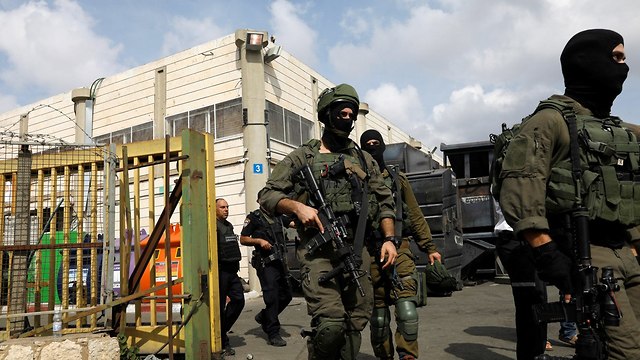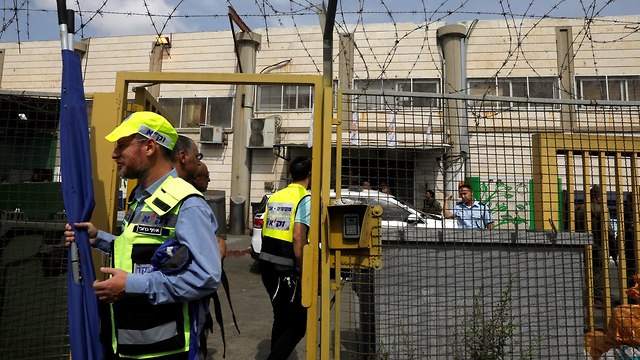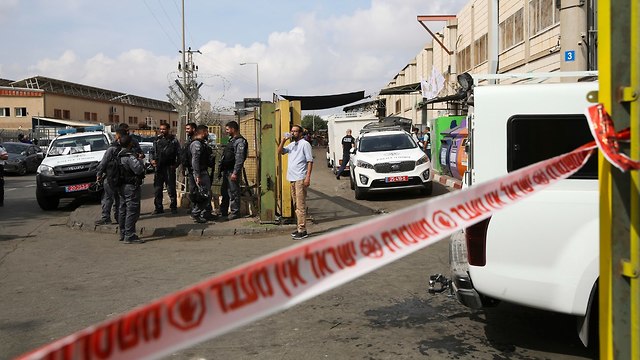
Employees of Barkan factory fear coexistence is in danger
The industrial zone's perception as a center of a joint economic success appears to have been shattered after a 23-year-old Palestinian murdered Ziv Hagbi and Kim Levengrond Yehezkel with an M-16 rifle; Alon recycling factory employees say incident 'destroyed everything.'
The Barkan industrial zone in the West Bank, where the factory is located, has for years served as a focal point of coexistence in the workplace and is presented to the world as a center for joint—Israeli and Palestinian—economic success. It is located along Route 5, a short drive from Rosh HaAyin, and has more than 100 different factories that provide a livelihood for those living on on both sides of the Green Line.
On Sunday morning this idyllic perception appeared to have been shattered as 23-year-old Ashraf Na'alwa, a local electrician from the village of Shweiki near Tulkarem, snuck an M-16 rifle into an office floor of the recycling factory and shot three employees—two of whom fatally.
Assaf, the manager of the Alon factory, told Ynet that he is in charge of 75 Palestinian workers, with whom, he claims, he has a good relationship.
"I believe in coexistence, but one destroys everything," he stressed.
Mazouz, a Palestinian father of three, who works at a store across the street, shared the sentiments.
“Everyone here gets along. The Alon factory has been operating for 3-4 years now, and employs 300 Palestinian workers … Every year, on Rosh Hashanah, the factory’s owners organize a barbecue for all the employees, and they invite us as well,” he explained.
"Everyone just wants to bring home the money," Mazouz added.
On Sunday, the factory’s workers, Jews and Arabs, gathered together outside the building and watched as the security forces conducted the initial investigation. According to them, when they enter the factory’s gates, politics remain outside.
Haron and Amir, two Palestinian workers at a nearby plastic factory in Barkan, also said they were interested in preserving their livelihood and good relations with their Jewish colleagues.
They stressed they had already started to feel the change in attitude following the incident as security at the industrial zone’s entrance detained them for several hours during a security check.
“We do not want this mess," said Haron, a father of three. Amir added that the terrorist's actions will make the situation difficult for everyone.
The coexistence between Palestinian and Jewish workers has evolved over the years, as joint soccer matches and Friday meals became an ordinary occurrence. The factory owners in the industrial area say they provide their employees with exceptional conditions: salaries, assistance and social benefits.
The Shomron Regional Council—the main offices of which are located in the Barkan industrial zone, prides itself on bridging the gap between Jews and Arabs. However, its representatives say the terror attack will immensely harm the local businesses and will strike a mortal blow to local Palestinian residents’ economic welfare.
The council’s head, Yossi Dagan, also addressed the attack, calling it “a very serious incident.”
"This is a serious incident in an area which symbolizes a bridge of coexistence in the heart of the West Bank. More than 8,000 people are employed in the Barkan industrial area—half of whom are Jewish and half are residents of the Palestinian Authority," he bemoaned.
The chase for the perpetrator is still ongoing.
The Border Police's counter terrorism special unit Yamam, the elite Duvdevan unit, the counterterrorism Lotar unit, and the IDF Oketz Unit, as well as Shin Bet forces and Central Command and West Bank Brigade soldiers, are taking part in the manhunt for the terrorist.



















